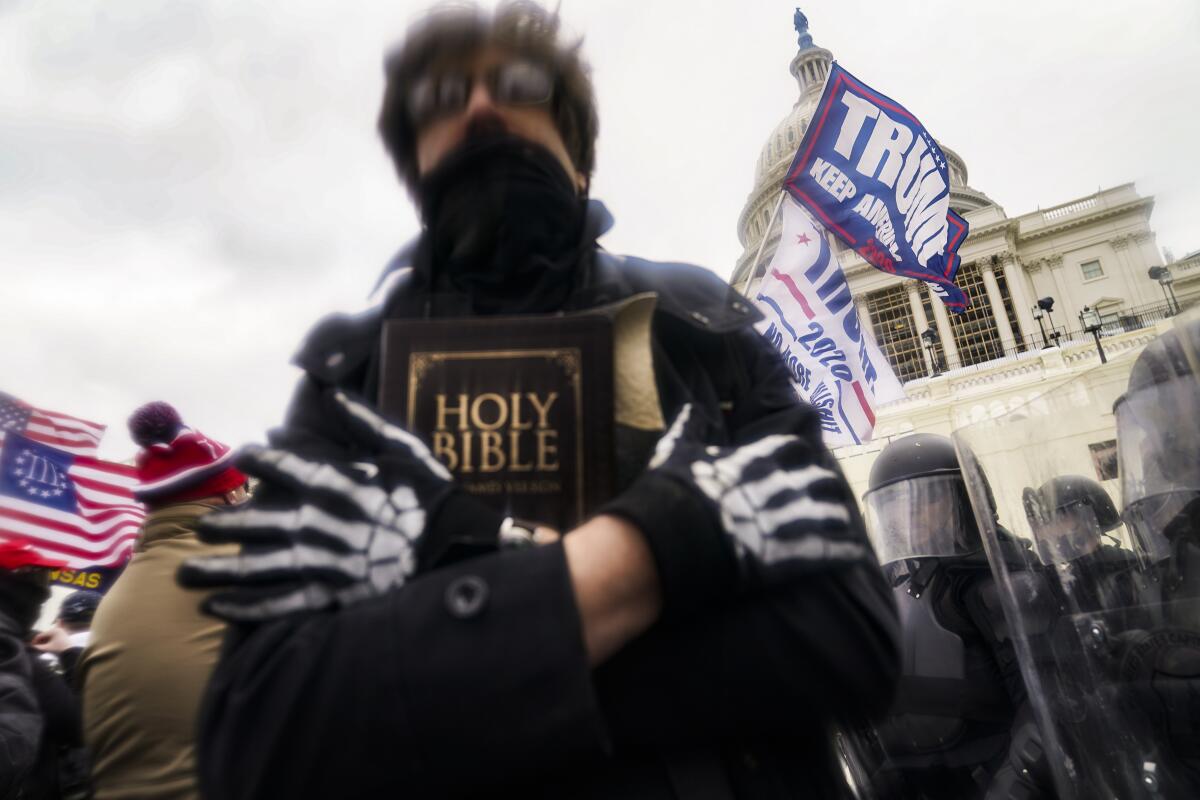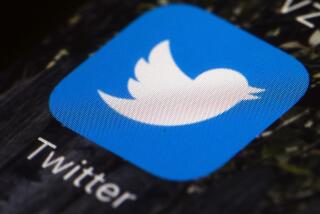Opinion: It took a mob riot for Twitter to finally ban Trump

- Share via
Whose megaphone will President Trump use now?
In the wake of the horrifying attack on the U.S. Capitol, major social media companies have all “deplatformed” Trump and some of his fellow traffickers in false claims about the November 2020 election. The last to join in the cancel ceremonies was Twitter, Trump’s favorite vehicle for spreading deception and calumny.
After Twitter finally started labeling Trump’s deceptive tweets for what they were last May, I wrote that the company had waited three years too long. That delay, combined with Twitter’s ongoing refusal to make Trump abide by the rules that apply to everyone else on the network, made Friday’s ban inevitable.
The long-overdue deplatforming could be an analgesic for the Trumpists’ fever dreams about overturning Joe Biden’s victory in November, which Congress formally certified several hours after the Capitol was cleared. No other microblogging or messaging service has the reach in the United States of Facebook, Instagram or YouTube. None can have the sort of impact for Trump that Twitter has.
But some critics, especially those on the right, object to the giant social networks enforcing their terms of service simply because they are giant. Their scale, these observers argue, has transformed them into the 21st century equivalent of the public commons.
Maybe so! But that doesn’t change the fact that they are not government actors, so they’re not bound by the 1st Amendment. And even promoting a free speech culture does not mean amplifying all speech.
Twitter’s analysis of Trump’s last two tweets, issued after the president’s personal account had been suspended for a day, is instructive.
The first tweet proclaimed that “The 75,000,000 great American Patriots who voted for me, AMERICA FIRST, and MAKE AMERICA GREAT AGAIN, will have a GIANT VOICE long into the future. They will not be disrespected or treated unfairly in any way, shape or form!!!” The second stated, “To all of those who have asked, I will not be going to the Inauguration on January 20th.”
The company looked across the Twitterverse to see how the tweets were being interpreted by Trump’s seditious followers. And what it found was chilling.
Trump’s use of the phrase “great American Patriots,” Twitter said, was “being interpreted as support for those committing violent acts at the U.S. Capitol.” Trump’s announcement that he’s blowing off the Inauguration was seen by some “as further confirmation that the election was not legitimate” and as a disavowal of the president’s stated support for an orderly transition of power. “The second Tweet may also serve as encouragement to those potentially considering violent acts that the Inauguration would be a ‘safe’ target, as he will not be attending,” Twitter wrote.
That’s some quality signal tracing right there.
But for heaven’s sake, why did it take a mob of Trump zealots storming the Capitol, and five deaths that resulted, for Twitter to look at what Trump has been signaling across its network? Or for Facebook to cut off Trump’s use of its network to microtarget his snake oil?
Facebook CEO Mark Zuckerberg has said he doesn’t feel comfortable playing the role of speech police. But he’s created one of the world’s most powerful amplifiers, and he’s rightly set standards — low standards, sadly — for what people can do with it. World leaders should be held to the same rules as everyone else; otherwise, social networks are giving those politicians a means to communicate which is less transparent and public than the powerful soapboxes that come with their offices.
Twitter similarly has said there’s a public interest in seeing what’s on the minds of important figures. But those figures have their own platforms and their own microphones. No private company is obligated to hand over its platform to a president in the supposed interest of newsworthiness and history. That just feels like a pretext for maintaining the huge audiences that controversial figures such as Trump bring.
Going forward, there’s only one way for Facebook, Twitter and their counterparts to proceed: Enforce their rules against misinformation, threats and slander diligently and fairly against every user, no matter how powerful or weak. Otherwise, they’re just inviting outraged regulators and lawmakers to set and enforce the rules for them.
More to Read
A cure for the common opinion
Get thought-provoking perspectives with our weekly newsletter.
You may occasionally receive promotional content from the Los Angeles Times.











